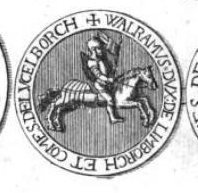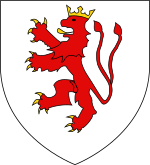| Revision as of 22:18, 9 October 2017 editParamandyr (talk | contribs)Extended confirmed users, Pending changes reviewers49,807 edits added references← Previous edit | Latest revision as of 02:58, 18 November 2024 edit undoВекочел (talk | contribs)Extended confirmed users, Pending changes reviewers, Rollbackers53,223 edits removed Category:Jure uxoris officeholders; added Category:Jure uxoris counts using HotCat | ||
| (27 intermediate revisions by 24 users not shown) | |||
| Line 1: | Line 1: | ||
| {{Short description|Duke of Limburg and Count of Arlon}} | |||
| ⚫ | {{ infobox |
||
| ⚫ | {{Use dmy dates|date=July 2021}} | ||
| ⚫ | | name = Waleran III, Duke of Limburg | ||
| ⚫ | {{ infobox noble | ||
| ⚫ | | image = Waleran III of Limburg.png | ||
| ⚫ | | name = Waleran III, Duke of Limburg | ||
| | caption = Seal of Waleran. | |||
| ⚫ | | image = Waleran III of Limburg.png | ||
| | noble family = ] | |||
| | |
| caption = Seal of Waleran. | ||
| | |
| noble family = ] | ||
| | |
| father = ] | ||
| | mother = Sophie of Saarbrücken | |||
| | birth_date = {{circa| 1165}} | |||
| | spouse = Cunigunda of Lorraine<br/>] | |||
| ⚫ | | birth_place = | ||
| | |
| birth_date = {{circa| 1165}} | ||
| ⚫ | | birth_place = | ||
| ⚫ | | death_place = ] | ||
| | death_date = {{death date|1226|7|2|df=y}} | |||
| ⚫ | | death_place = ] | ||
| | burial_place = ] | | burial_place = ] | ||
| }} | }} | ||
| ], with a crown |
], with a crown and two tails.]] | ||
| '''Waleran III''' (or '''Walram III''') ({{circa|1165}} – 2 July 1226) was initially lord of ], then ] of ] from 1214. He became count of ] and ] of ] on his father's death in 1221. He was the son of ] and Sophia of Saarbrücken. | '''Waleran III''' (or '''Walram III''') ({{circa|1165}} – 2 July 1226) was initially lord of ], then ] of ] from 1214. He became count of ] and ] of ] on his father's death in 1221. He was the son of ] and Sophia of Saarbrücken. | ||
| As a younger son, he did not expect to inherit. He carried on an adventurous youth and took part in the ] in 1192.{{sfn|Gade|1951|p=77}} In 1208, the imperial candidate ] died and Waleran, his erstwhile supporter, turned to his opponent, ]. In 1212, he accompanied his first cousin ], to ], then in a war with ]. Waleran's first wife, Cunigunda, a daughter of ], died in 1214 and in May he married ],{{sfn|Péporté|2011|p=109-110}} and became count {{lang|la| |
As a younger son, he did not expect to inherit. He carried on an adventurous youth and took part in the ] in 1192.{{sfn|Gade|1951|p=77}} In 1208, the imperial candidate ] died and Waleran, his erstwhile supporter, turned to his opponent, ]. In 1212, he accompanied his first cousin ], to ], then in a war with ]. Waleran's first wife, Cunigunda, a daughter of ], died in 1214 and in May he married ],{{sfn|Péporté|2011|p=109-110}} and became count {{lang|la|]}} there. | ||
| In 1221, he inherited Limburg |
In 1221, he inherited Limburg. In 1223, he again tried to take Namur from the ] ]. He failed and signed a peace treaty on 13 February in ]. He then took part in various imperial diets and accompanied the ] into Italy. Returning from there, he died in ]. | ||
| ==Family and children== | ==Family and children== | ||
| Waleran |
Waleran married as his first wife, Cunigunda of Lorraine,{{sfn|Loud|Schenk|2017|p=xxix}} daughter of ]. Later he married, Ermesinda of Luxembourg.{{sfn|Loud|Schenk|2017|p=xxix}} | ||
| Children with Cunigunda of Lorraine: | Children with Cunigunda of Lorraine: | ||
| # Sophie (c. 1190 – 1226/27), married c. 1210 ] | # Sophie (c. 1190 – 1226/27), married c. 1210 ] | ||
| # Matilda (c. 1192 – aft. 1234), married c. 1210 William III of Jülich, mother of ] | # Matilda (c. 1192 – aft. 1234), married c. 1210 ], mother of ] | ||
| # ]{{sfn|Loud|Schenk|2017|p=xxix}} | # ], married ], heiress of the County of Berg, a daughter of the count ]{{sfn|Loud|Schenk|2017|p=xxix}} | ||
| # Waleran (c. 1200 – 1242), married Elisabeth of Bar, daughter of Ermesinda of Luxembourg |
# Waleran (c. 1200 – 1242), married Elisabeth of Bar, daughter of Ermesinda of Luxembourg and ] | ||
| Children with ]: | Children with ]: | ||
| # Catherine (c. 1215 – 1255), married ], nephew of Waleran's first wife | # ] (c. 1215 – 1255), married ], nephew of Waleran's first wife | ||
| # ]{{sfn|Loud|Schenk|2017|p=xxix}} | # ] married ]{{sfn|Loud|Schenk|2017|p=xxix}} | ||
| # ], Count of Durbuy | # ], Count of ] | ||
| ==Notes== | ==Notes== | ||
| {{ |
{{Reflist}} | ||
| ==References== | ==References== | ||
| *{{ |
*{{Cite book|title=Luxemburg in the Middle Ages |last=Gade |first=John A. |publisher=E.J. Brill |year=1951 }} | ||
| *{{ |
*{{Cite book|title=The Origins of the German Principalities, 1100-1350: Essays by German Historians |editor-first1=Graham A. |editor-last1=Loud |editor-first2=Jochen |editor-last2=Schenk |publisher=Routledge |year=2017 }} | ||
| *{{ |
*{{Cite book|first=P. |last=Péporté |title=Historiography, Collective Memory and Nation-Building in Luxembourg |publisher=Brill |year=2011 }} | ||
| {{s-start}} | {{s-start}} | ||
| {{s-hou|]||1165|2 July|1226}} | {{s-hou|]||1165|2 July|1226}} | ||
| {{Succession box | {{Succession box | ||
| | title = ] |
| title = ] |with = ] | ||
| | years = |
| years = 1214–1226 | ||
| | before = ] and ] | | before = ] and ] | ||
| | after = ] | | after = ] | ||
| Line 70: | Line 72: | ||
| | after = ] | | after = ] | ||
| }} | }} | ||
| ⚫ | {{s-end}} | ||
| |- | |||
| ⚫ | {{end}} | ||
| {{Monarchs of Luxembourg}} | {{Monarchs of Luxembourg}} | ||
| ⚫ | {{Use dmy dates|date= |
||
| {{Authority control}} | {{Authority control}} | ||
| {{DEFAULTSORT:Waleran 03 of Limburg}} | {{DEFAULTSORT:Waleran 03 of Limburg}} | ||
| ] | ] | ||
| ] | ] | ||
| ] | |||
| ] | ] | ||
| ] | ] | ||
| ] | ] | ||
| ] | |||
| ] | |||
| ] | |||
| ] | |||
Latest revision as of 02:58, 18 November 2024
Duke of Limburg and Count of Arlon
| Waleran III, Duke of Limburg | |
|---|---|
 Seal of Waleran. Seal of Waleran. | |
| Born | c. 1165 |
| Died | (1226-07-02)2 July 1226 Rolduc |
| Buried | Rolduc Abbey |
| Noble family | House of Limburg |
| Spouse(s) | Cunigunda of Lorraine Ermesinda of Luxembourg |
| Father | Henry III of Limburg |
| Mother | Sophie of Saarbrücken |

Waleran III (or Walram III) (c. 1165 – 2 July 1226) was initially lord of Montjoie, then count of Luxembourg from 1214. He became count of Arlon and duke of Limburg on his father's death in 1221. He was the son of Henry III of Limburg and Sophia of Saarbrücken.
As a younger son, he did not expect to inherit. He carried on an adventurous youth and took part in the Third Crusade in 1192. In 1208, the imperial candidate Philip of Swabia died and Waleran, his erstwhile supporter, turned to his opponent, Otto of Brunswick. In 1212, he accompanied his first cousin Henry I, Duke of Brabant, to Liège, then in a war with Guelders. Waleran's first wife, Cunigunda, a daughter of Frederick I, Duke of Lorraine, died in 1214 and in May he married Ermesinda of Luxembourg, and became count jure uxoris there.
In 1221, he inherited Limburg. In 1223, he again tried to take Namur from the Margrave Philip II. He failed and signed a peace treaty on 13 February in Dinant. He then took part in various imperial diets and accompanied the Emperor Frederick II into Italy. Returning from there, he died in Rolduc.
Family and children
Waleran married as his first wife, Cunigunda of Lorraine, daughter of Frederick I, Duke of Lorraine. Later he married, Ermesinda of Luxembourg.
Children with Cunigunda of Lorraine:
- Sophie (c. 1190 – 1226/27), married c. 1210 Frederick of Isenberg
- Matilda (c. 1192 – aft. 1234), married c. 1210 William III, Count of Jülich, mother of William IV, Count of Jülich
- Henry IV, Duke of Limburg, married Irmgard of Berg, heiress of the County of Berg, a daughter of the count Adolf VI
- Waleran (c. 1200 – 1242), married Elisabeth of Bar, daughter of Ermesinda of Luxembourg and Theobald I, Count of Bar
Children with Ermesinde, Countess of Luxembourg:
- Catherine of Limburg (c. 1215 – 1255), married Matthias II, Duke of Lorraine, nephew of Waleran's first wife
- Henry V, Count of Luxembourg married Margaret of Bar
- Gerhard, Count of Durbuy
Notes
- Gade 1951, p. 77.
- Péporté 2011, p. 109-110.
- ^ Loud & Schenk 2017, p. xxix.
References
- Gade, John A. (1951). Luxemburg in the Middle Ages. E.J. Brill.
- Loud, Graham A.; Schenk, Jochen, eds. (2017). The Origins of the German Principalities, 1100-1350: Essays by German Historians. Routledge.
- Péporté, P. (2011). Historiography, Collective Memory and Nation-Building in Luxembourg. Brill.
| Waleran III, Duke of Limburg House of Ardennes-VerdunBorn: 1165 Died: 2 July 1226 | ||
| Preceded byErmesinde and Theobald | Count of Luxemburg 1214–1226 With: Ermesinde |
Succeeded byErmesinde |
| Preceded byHenry III | Duke of Limburg 1221–1226 |
Succeeded byHenry IV |
| Count of Arlon 1221–1226 |
Succeeded byHenry V | |
| Monarchs of Luxembourg | ||||||||||||||||||||
|---|---|---|---|---|---|---|---|---|---|---|---|---|---|---|---|---|---|---|---|---|
| ||||||||||||||||||||
| ||||||||||||||||||||
| ||||||||||||||||||||


